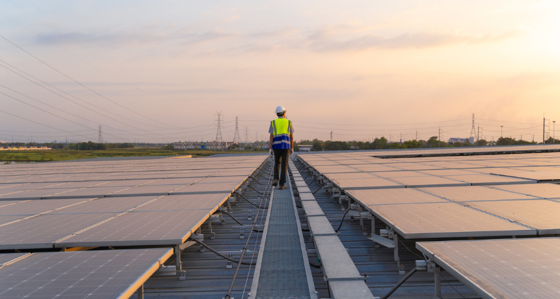
All eyes on Washington - Biden's climate commitments won't move the US beyond 'blah' until his Build Back Better bill passes Congress
3 November 2021
The eyes of the world are on Glasgow. But to understand how credible and durable America’s decarbonisation policies are, it’s Washington, not Glasgow, where we should be focusing our attention.
Biden has committed to reducing greenhouse gas emissions by 50% - 52% by 2030 compared to 2005 levels and to net-zero emissions by 2050. At COP, his administration launched a new report laying out its long-term strategy for making this a reality. But unless Biden’s Build Back Better bill makes it through Congress next week, any pledges made at COP26 are meaningless.
If passed, the $555 billion allocation to the climate agenda proposed by the president will become the largest single climate investment in US history. But if the Build Back Better bill doesn’t make it through Congress, then Biden will struggle to move beyond what Greta Thunberg calls ‘blah’. The federal regulatory commitments to tackle methane leaks that have been announced are welcome, but it is uncertain what they will mean for existing oil and gas infrastructure on non-federal land, where state level policy has traditionally been dominant.
The United States is already well behind the European Union in terms of decarbonisation policy maturity and they could fall further behind without a breakthrough. The way things are looking, it’s a stark possibility that Biden could well see his first term delivering no real progress towards achieving his emissions targets. The real problem Biden faces is durability, the depth and breadth of political support, where the US lags behind the other three major emitters, namely China, India and the EU. A lack of bi-partisan support over energy policy and climate change is frustrating Biden’s ability to push forward on his agenda.
Looking at the US’ emissions since 2005, there is a definite downward trajectory, but without new policies passing Congress this progress will flat line according to Climate Action Tracker. Biden hopes for a radical shift pushing the United States towards a Paris aligned pathway. His most aggressive policies come in the power generation sector, where he hopes for zero emissions by 2035, but transport and particularly electric vehicles also play a key role. Should it come, then the approval of these policies in Congress will allow the US to become the climate change leader it so keenly wishes to be.
The next step, turning these pledges into action, will depend on numerous factors, including but not limited to the evolution of technologies, the specifics of policy and regulatory packages, and socioeconomic factors such as the economic growth, demographic shifts and market prices across commodities and fuels. The country’s transition will require a multi-pronged approach, with the private sector, the sub-national and federal governments moving collaboratively in the same trajectory to generate new regulation, direct investment, and programs at all levels of the US government.
How credible and durable are the climate commitments made at COP26?
Baringa Partners has created a Credibility & Durability index that evaluates a country’s emissions commitments and then measures these commitments to determine if they are on the right course.
The index specifically looks at:
Credibility: A measure of policy maturity. How developed is domestic decarbonisation policy in relation to Net Zero? Are rhetorical commitments backed up with substantial policy?
Durability: A measure of the depth and breadth of political support. How vulnerable is the energy transition to political and economic shocks?
Explore the index in relation to the world’s 4 largest emitters: the US, the EU, India and China.
Related Insights

What might a reformed GB national power market look like under REMA?
Discover how a reformed national market is likely to include significant changes to current market arrangements, with material impacts for market participants.
Read more
Investing in uncertainty: European power market outlook 2025
Our latest outlook points to a more uncertain energy transition, shaped by political and economic volatility across Europe in the form of Trade Wars, Populism and Remilitarisation.
Read more
REMA and investing in GB power market under uncertainty
Learn about the opportunities and challenges of investing in the GB power market under uncertainty and how Baringa can help
Read more
Three ways in which increased volatility and flexibility are reshaping Spain’s energy market
Spain's energy market faces profound change due to curtailment, negative prices, and a recent blackout, discussed at our roundtable event.
Read moreIs digital and AI delivering what your business needs?
Digital and AI can solve your toughest challenges and elevate your business performance. But success isn’t always straightforward. Where can you unlock opportunity? And what does it take to set the foundation for lasting success?